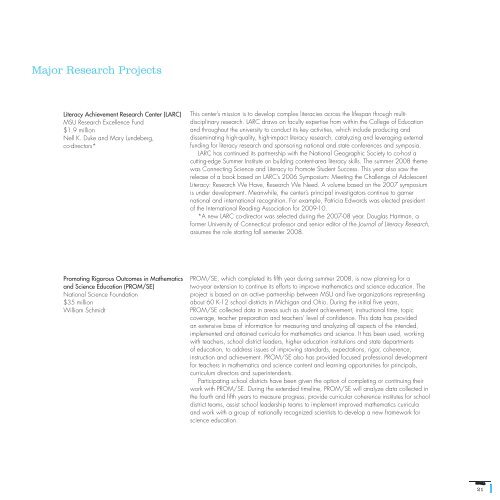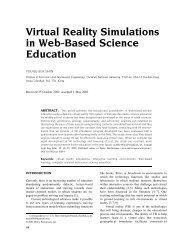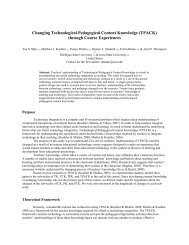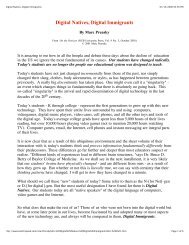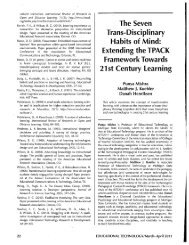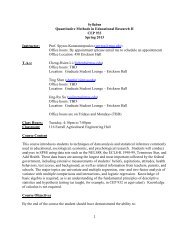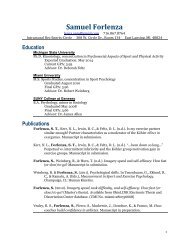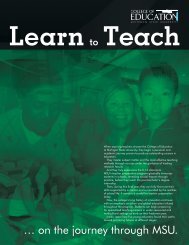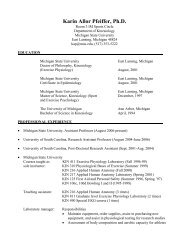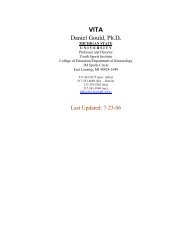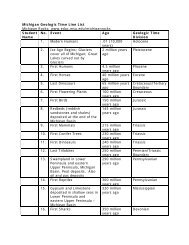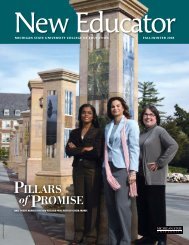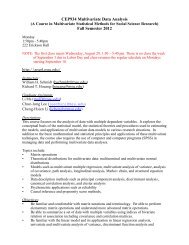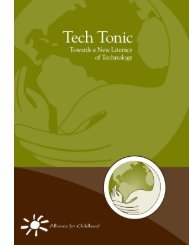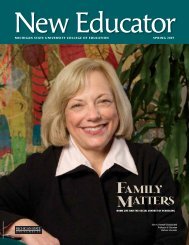Annual Report - College of Education - Michigan State University
Annual Report - College of Education - Michigan State University
Annual Report - College of Education - Michigan State University
Create successful ePaper yourself
Turn your PDF publications into a flip-book with our unique Google optimized e-Paper software.
Major Research Projects<br />
Literacy Achievement Research Center (LARC)<br />
MSU Research Excellence Fund<br />
$1.9 million<br />
Nell K. Duke and Mary Lundeberg,<br />
co-directors*<br />
This center’s mission is to develop complex literacies across the lifespan through multidisciplinary<br />
research. LARC draws on faculty expertise from within the <strong>College</strong> <strong>of</strong> <strong>Education</strong><br />
and throughout the university to conduct its key activities, which include producing and<br />
disseminating high-quality, high-impact literacy research, catalyzing and leveraging external<br />
funding for literacy research and sponsoring national and state conferences and symposia.<br />
LARC has continued its partnership with the National Geographic Society to co-host a<br />
cutting-edge Summer Institute on building content-area literacy skills. The summer 2008 theme<br />
was Connecting Science and Literacy to Promote Student Success. This year also saw the<br />
release <strong>of</strong> a book based on LARC’s 2006 Symposium: Meeting the Challenge <strong>of</strong> Adolescent<br />
Literacy: Research We Have, Research We Need. A volume based on the 2007 symposium<br />
is under development. Meanwhile, the center’s principal investigators continue to garner<br />
national and international recognition. For example, Patricia Edwards was elected president<br />
<strong>of</strong> the International Reading Association for 2009-10.<br />
*A new LARC co-director was selected during the 2007-08 year. Douglas Hartman, a<br />
former <strong>University</strong> <strong>of</strong> Connecticut pr<strong>of</strong>essor and senior editor <strong>of</strong> the Journal <strong>of</strong> Literacy Research,<br />
assumes the role starting fall semester 2008.<br />
Promoting Rigorous Outcomes in Mathematics<br />
and Science <strong>Education</strong> (PROM/SE)<br />
National Science Foundation<br />
$35 million<br />
William Schmidt<br />
PROM/SE, which completed its fifth year during summer 2008, is now planning for a<br />
two-year extension to continue its efforts to improve mathematics and science education. The<br />
project is based on an active partnership between MSU and five organizations representing<br />
about 60 K-12 school districts in <strong>Michigan</strong> and Ohio. During the initial five years,<br />
PROM/SE collected data in areas such as student achievement, instructional time, topic<br />
coverage, teacher preparation and teachers’ level <strong>of</strong> confidence. This data has provided<br />
an extensive base <strong>of</strong> information for measuring and analyzing all aspects <strong>of</strong> the intended,<br />
implemented and attained curricula for mathematics and science. It has been used, working<br />
with teachers, school district leaders, higher education institutions and state departments<br />
<strong>of</strong> education, to address issues <strong>of</strong> improving standards, expectations, rigor, coherence,<br />
instruction and achievement. PROM/SE also has provided focused pr<strong>of</strong>essional development<br />
for teachers in mathematics and science content and learning opportunities for principals,<br />
curriculum directors and superintendents.<br />
Participating school districts have been given the option <strong>of</strong> completing or continuing their<br />
work with PROM/SE. During the extended timeline, PROM/SE will analyze data collected in<br />
the fourth and fifth years to measure progress, provide curricular coherence institutes for school<br />
district teams, assist school leadership teams to implement improved mathematics curricula<br />
and work with a group <strong>of</strong> nationally recognized scientists to develop a new framework for<br />
science education.<br />
21


